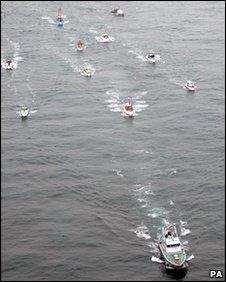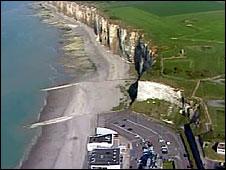The men left behind after Dunkirk
- Published

The voyage of the "little ships" is being recreated for the anniversary
The rescue of allied troops from Dunkirk remains the central focus of this weekend's 70th anniversary commemorations, but the story of those days in May 1940 extends far beyond the beaches.
When Operation Dynamo was formally wound up, more than 100,000 men were still in France, some fighting with the rearguard against the advancing German army, others looking for other ways to escape.
John Borland was a Cameron Highlander serving with the 51st Highland Division. He never reached Dunkirk but was forced to hold the line further west.
At his home in Glasgow, he recalled long, hungry days on the road.
"You really got used to it as the days went on... taking up your positions... being ready," said Mr Borland, now 90. "The odds were stacked against us, but we fought on.
"You're not really afraid, because you know there's a job to be done, though today I get scared just thinking about it."
Bert Evans, serving with the Warwickshire Regiment, was facing an elite German SS division near the town of Wormhout.
"We were the ones who stopped them breaking through," said the 89-year-old from Redditch, Worcestershire. "And we suffered for it.
"We'd heard about the SS and we knew they didn't take prisoners."
Mr Evans's fears were well-founded: after he and 80 other soldiers were herded into a small barn, the SS threw hand grenades into the building before firing indiscriminately.
"I was saved because I was under a pile of bodies," he told me. "I thought I was lucky to be alive."
Fewer than 20 of the men forced into the barn came out alive.
Mr Evans's injuries would eventually cost him his right arm, but he managed to escape by crawling along a ditch and taking cover in a small pond.
The company commander hiding with him was gunned down when he tried to make a run for it. The memories haunt Mr Evans, visibly upset at their recollection.
"It's an ordeal and I don't wish to remember it, I wish to forget it," he said.
"It's an ordeal just thinking about it... I don't want to remember what happened, but it keeps me awake at night."
'Don't give up'
Mr Borland and the Highlanders eventually ended up in St Valery, a tiny fishing village near Dieppe.
"There was quite a bit of wreckage lying about and then after that came a lot of refugees, which hampered us quite a bit," Mr Borland said.
"We were very, very much exhausted because of being alert 24 hours a day. There was very little sleep."
The rearguard now had little chance of escape, with the town ablaze and the Germans shelling them from the clifftops above. The ships waiting offshore could not reach them.

German shelling from the cliffs above St Valery trapped the allies' rearguard
The scene was littered with the bodies of dead and injured allied troops, many having tried to reach safety by climbing down the towering cliffs.
Surrender was now the only option to prevent more lives being lost.
"There was a major who informed us that the word had come from Britain that we must lay down our arms," said Mr Borland. "There was quite a bit of argument about it but, coming from a major, we had to obey orders."
By the time of the surrender it was mid-June, more than two weeks after the start of the Dunkirk evacuation.
Of the Britons left behind by Operation Dynamo, 11,000 died and 40,000 were captured and imprisoned.
As he was marched away to five years of captivity, Mr Borland spotted a scrap of paper blowing across his path. He has it still.
"It was a biblical text, with the words 'Don't give up' scrawled in pencil, probably by the man who'd dropped it.
"Those words stayed with me through my time in the POW camps."
Had he ever given up, I asked him. The answer was unequivocal: "Never."
A BBC News special programme on the 70th anniversary of the "little ships" evacuation of Dunkirk will be shown on Sunday 30 May at 1130 BST on BBC Two.
- Published27 May 2010